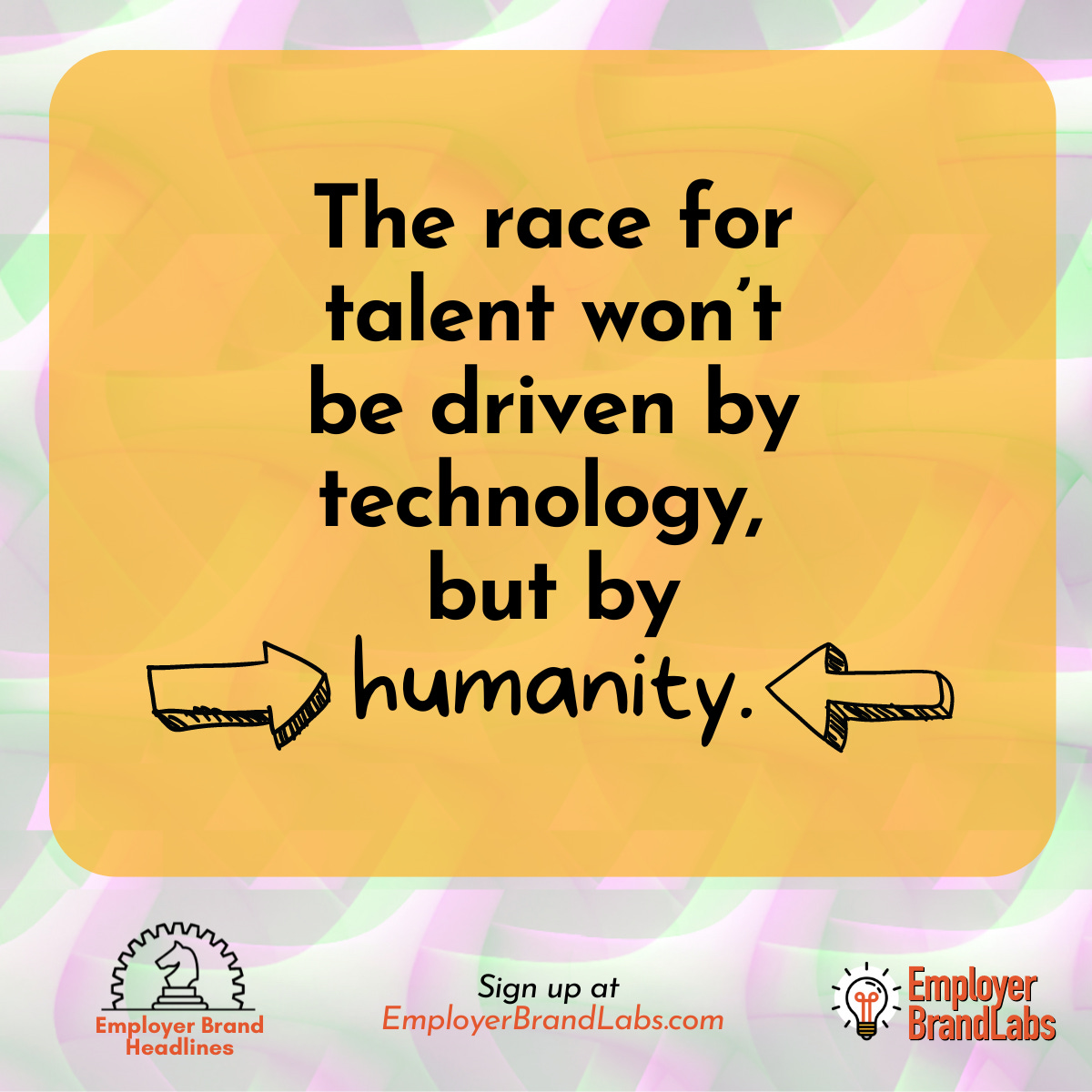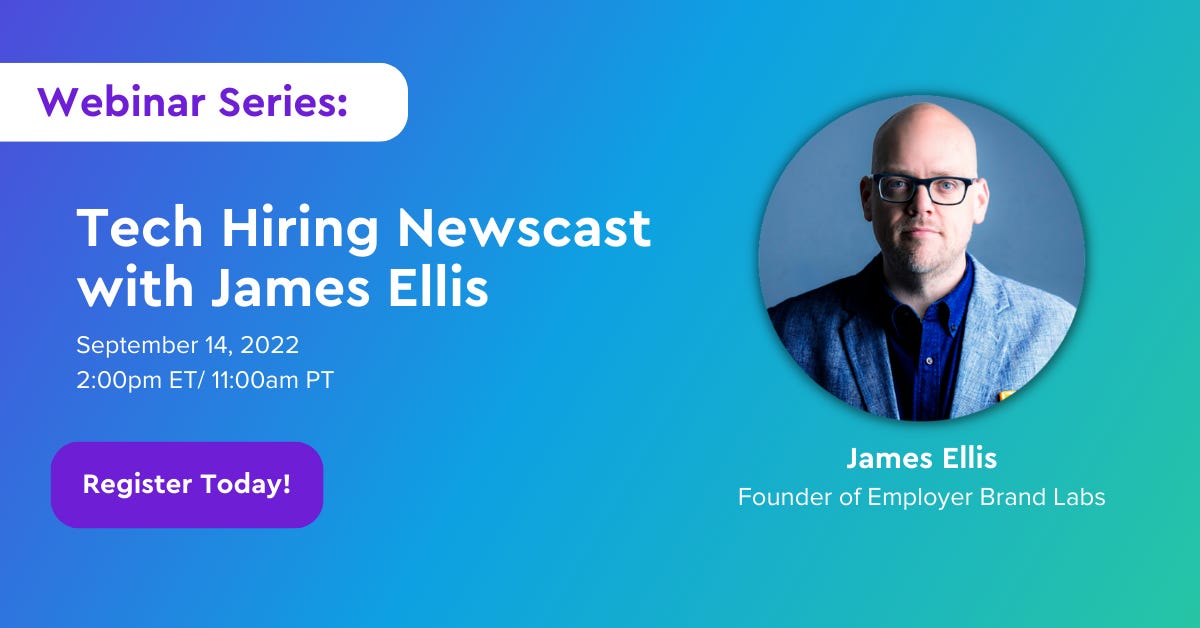I feel seen. 🔬 (EBH#165: Rev It Up)
The race for talent centers on how well you understand your audience
The mission: Create a million employer brand thinkers (like you!)
Employer Brand Headlines is written by James Ellis. »» Yes, you should say hello! ««
First…
We all know that all our companies have employer brands. The question is whether we are taking advantage of those brands to make an impact. One clear and obvious way is to get recruiters trained on how to use the brand.
That’s why I developed Employer Brand for Recruiters, a complete video course to teach recruiters how to level up what they do simply by understanding and using their employer brand properly.
I’m now offering group rates for companies who want to get a bunch of recruiters to take the course together. Interested? Ping me at employerbrandnerd@gmail.com.
The Big Idea
We’ve survived the industrial revolution of talent and hiring. The era defined by the expectation that companies could build “hiring machines:” ATS outfitted with expensive sourcing, evaluation and sorting attachments fed by recruiters and cheered on by hiring managers. In go the LinkedIn profiles and out comes the candidates. “Faster! More candidates!” people cheered.
Look how far that got us.
It turns out that people (you know, those things that make resumes and bug your recruiters) don’t like being treated by commoditized units of “talent.” They like being treated like people.
So what do people want?
It seems like a simple question, but you already know it really isn’t. What you want isn’t necessarily what I want and vice versa. Some people want the money truck to back up to their house. Some people want to feel like they’ve made a positive difference in peoples’ lives. Some people want to test and prove themselves. Some people want to work as one with a team. Some people want to be famous (or at least crave recognition).
There are a lot of things that motivate people (and even more ways break those drivers into neat and discrete buckets (Paging Messrs. Maslov and McClelland et al)), which gives you the chance to say, “people are too messy, so I’ll just appeal to their base instincts.”
That’s how you end up in perpetual salary negotiations with candidates and employees alike while lamenting the good old days of employee loyalty.
So I’ll bottom line things here. There is one motivation that everyone shares. It’s kind of a meta-driver, a skeleton key that opens almost every single lock (sociopaths need not apply). And that is the feeling of being seen.
The feeling that someone sees you, that they want to understand you, is nearly universal. Social creatures like humans they need to feel like they matter, and that are part of some kind of tribe.
But saying “I see you” isn’t enough. That’s lip service. You have to see people as they are. You need to see them as they want to be seen.
Put another way, you have to know who you are talking to. You have to understand what they want, what they care about, what they fear.
Some people want office parties and social hours and chatty offices and starting days off with questions about what they did that weekend. Some people want quiet and focus, to do their work during work hours so they can put it down when they are done.
Some people want volunteer days at work. Some people swag. Some people want flexible work hours. Some people want to give their all and end the day spent. Some people feel fulfilled when they know their work made a difference, and others feel more fulfilled when their boss mentions how good the work has been. Some people want kudos from leadership at the all hands and some people want a knowing nod and a nice note on their desk.
It feels like so much of talent acquisition has been turned into a game of who can spend the most on platforms and tech and tools and ads. I suspect that the company that shows (in very specific and real ways) the ways they not only care about their people, but actually listens to how each person wants to be cared about and cared for? Those are the companies that will attract the best talent.
So ask yourself: what does your perfect candidate care about? What are they worried about? What part of them is fulfilled by working there? What will they be rewarded for? What will make them crazy in this role?
The race for talent starts now on who can understand their people best.
Strategy Idea
Get focused. Too many channels are cluttered with “stuff.” Someone once mandated that you need to post something on LinkedIn (or Insta or Tik or wherever) once a day. Suddenly, value is measured by consistency of cadence, not content quality. Try this: block off one single day (yes, the entire day) and only work on one thing. You’ve got all day, so think: what would a candidate on LI want to hear about? What is the story only we can tell? What story can you tell in a series of three posts (or 12)? What could you do to make that post amazing, rather than space-filling? Can you re-write it to be so compelling that people have to share it? Is that the best graphic you can attach to it? Is that your best call to action?
We get so swamped with executables that we rarely have (or make) time for ourselves to make something truly great. Pretend your whole job is this LI post. So if this is the last LI post you ever do, what would you to make it legendary?
Maybe it turns out that doing things less often but way better gets you closer to your goals.
Headlines
I’m not going to get into a fight on whether or not LinkedIn running A/B tests on its own users to study strong versus weak ties was ethical (I don’t pay to use LI, so I assume I have no say in how LI presents information to me).
But the underlaying research is really interesting. It provides evidence (“proves” is WAY too strong a word here) that theories around weak ties having outsized value among job hunters (with exceptions and caveats) are generally true.
Why should you care? Because you and I live in a “weak ties” world. When we share content, yes, it gets seen by some number of our followers and fans, but the value is in that content getting to our audiences’ weak ties: people they met at a conference once, former coworkers they don’t actively keep in touch with any longer, coworkers of their spouse, etc. We don’t just build content for people we know, we build content for people THEY know.
This means you need to get more specific about what you claim because your fans are going to pass it around to their weak ties. Those people need a “hook” on which to start to start to think about you.
Also:
Quick Programming Note
I’m teaming up with Clinch for an 8-part webinar series, where I talk to employer brand and talent acquisition pros about what’s new in tech hiring. The next one is with Kurt Jones. We’ll talk about the world of tech recruiting from a product marketer’s point of view. Register here!
Also, I’m previewing my upcoming video course on doing your own competitive brand audits over at EB Stars (October 5th and 6th). Take a look at the full agenda here and then register here.
Inside the fortune cookie
“The ultimate, hidden truth of the world is that it is something that we make, and could just as easily make differently.” - David Graeber
Thank you!
This newsletter now has more than 2,800 subscribers. Thank you! Keep sharing the issues!
Search the 1,600 links referenced in the newsletter archive.
Download my ebook with 105 free (or almost free) ways to activate your employer brand.
Read Talent Chooses You for free from this open source Google Doc.
Here’s the 2022 version of The Employer Brand Manifesto.
If you have a question, reply to this email. It comes directly to me.
Cheers and thanks!
-James Ellis (LinkedIn)
Where the subject line came from:
Jerry Harrison - Rev It Up
David Byrne gets all the credit for Talking Heads (perhaps best encapsulated in the Documentary Now spoof of Stop Making Sense, which is glorious), and that’s not fair. Jerry Harrison, who was ostensibly a “hired gun” for the band despite having already been in The Modern Lovers, was the unseen hand in the band, bringing new levels of musicality and musicianship to the group, making Byrnes ideas work.
So it’s no surprise he became an amazing producer. He produced most of Live’s catalog, along with hits for Crash Test Dummies, The Verve Pipe, No Doubt and the Von Bondies (I personally think his work on The Bogmen’s first album was amazing, even though no one remembers them). But he’s also a solid songwriter, having put out a string of solid solo albums. This song is the most famous, cracking the top ten in the US. If you’re old enough, you might not remember the name of the song, but about 20 seconds in and you’ll be grooving along to it.
If you are enjoying the music, congratulations, you’re old! Just for you, I made a Spotify playlist of all the subject line 80’s songs I’ve referenced over the last year and a half. You don’t even need hairspray to enjoy it:







